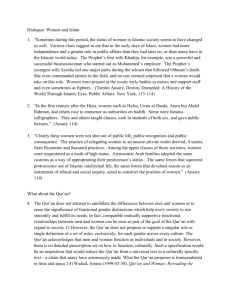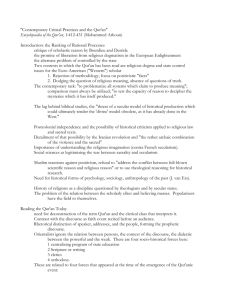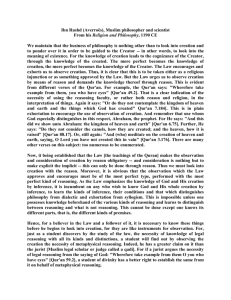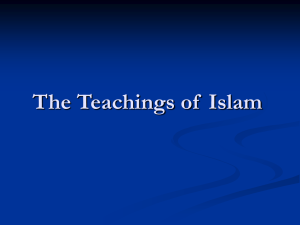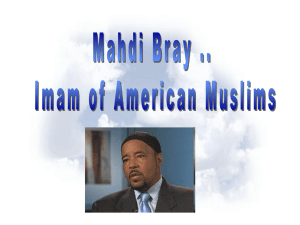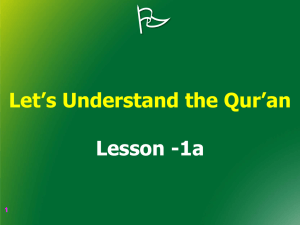Muhammad and the Qur`an Syllabus
advertisement
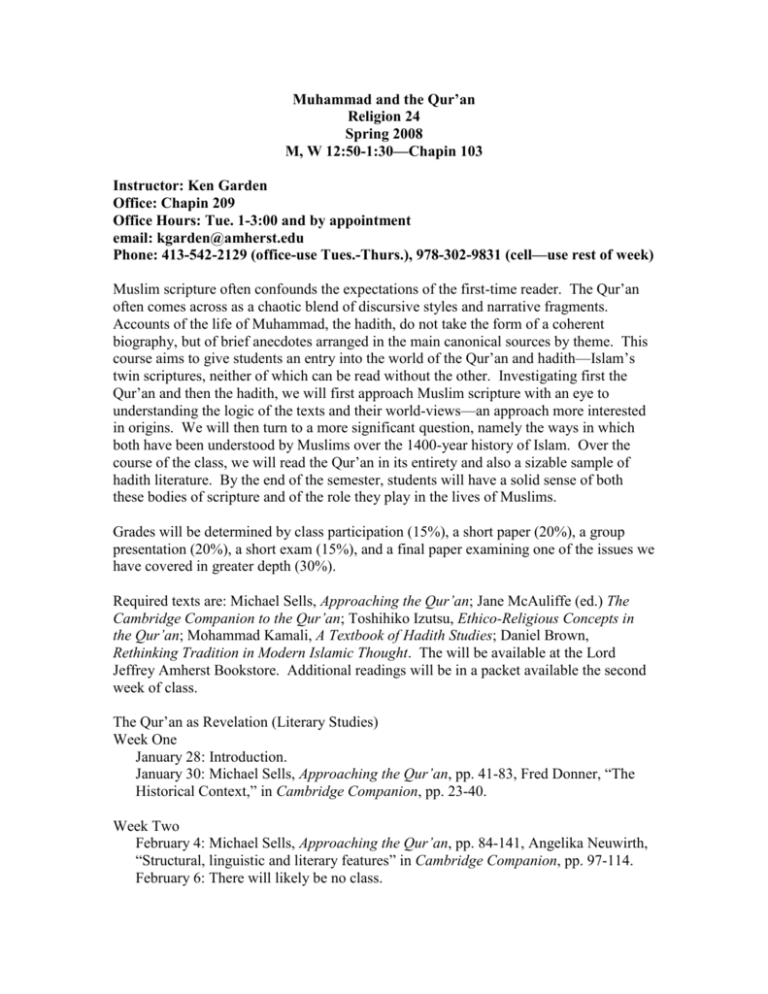
Muhammad and the Qur’an Religion 24 Spring 2008 M, W 12:50-1:30—Chapin 103 Instructor: Ken Garden Office: Chapin 209 Office Hours: Tue. 1-3:00 and by appointment email: kgarden@amherst.edu Phone: 413-542-2129 (office-use Tues.-Thurs.), 978-302-9831 (cell—use rest of week) Muslim scripture often confounds the expectations of the first-time reader. The Qur’an often comes across as a chaotic blend of discursive styles and narrative fragments. Accounts of the life of Muhammad, the hadith, do not take the form of a coherent biography, but of brief anecdotes arranged in the main canonical sources by theme. This course aims to give students an entry into the world of the Qur’an and hadith—Islam’s twin scriptures, neither of which can be read without the other. Investigating first the Qur’an and then the hadith, we will first approach Muslim scripture with an eye to understanding the logic of the texts and their world-views—an approach more interested in origins. We will then turn to a more significant question, namely the ways in which both have been understood by Muslims over the 1400-year history of Islam. Over the course of the class, we will read the Qur’an in its entirety and also a sizable sample of hadith literature. By the end of the semester, students will have a solid sense of both these bodies of scripture and of the role they play in the lives of Muslims. Grades will be determined by class participation (15%), a short paper (20%), a group presentation (20%), a short exam (15%), and a final paper examining one of the issues we have covered in greater depth (30%). Required texts are: Michael Sells, Approaching the Qur’an; Jane McAuliffe (ed.) The Cambridge Companion to the Qur’an; Toshihiko Izutsu, Ethico-Religious Concepts in the Qur’an; Mohammad Kamali, A Textbook of Hadith Studies; Daniel Brown, Rethinking Tradition in Modern Islamic Thought. The will be available at the Lord Jeffrey Amherst Bookstore. Additional readings will be in a packet available the second week of class. The Qur’an as Revelation (Literary Studies) Week One January 28: Introduction. January 30: Michael Sells, Approaching the Qur’an, pp. 41-83, Fred Donner, “The Historical Context,” in Cambridge Companion, pp. 23-40. Week Two February 4: Michael Sells, Approaching the Qur’an, pp. 84-141, Angelika Neuwirth, “Structural, linguistic and literary features” in Cambridge Companion, pp. 97-114. February 6: There will likely be no class. Week Three February 11: Auerbach, Mimesis, pp. 3-23; Sura of Joseph (Sura 12), Arberry, pp. 254-266; Genesis 37-50. 1st paper assignment: Do a similar comparison of Moses in Exodus to the depiction of Moses in Q: 17, 18, 19, 20, 26, 27, 28, 40, 44, 79. Write up your findings in a 3-5 page paper. Come to class on Feb. 20 having completed your paper and prepared to discuss the Moses of Exodus and the Moses of the Qur’an. February 13: Suras 2-4, Arberry, pp. 30-126; Daniel Madigen, “Themes and Topics” in Cambridge Companion, pp. 79-96. Week Four February 18: Suras 5-9, Arberry, pp. 127-223. February 20: First paper due. In class discussion of paper topic: the Moses of the Qur’an and the Moses of Exodus. Week Five: February 25: Suras 10-11; Andrew Rippin, “Western Scholarship and the Qur’an” in Cambridge Companion, pp. 235-254; 1/12/08 Wall Street Journal article, “The Lost Archive.” February 27: Suras 13-16; Toshihiko Izutsu, Ethico-Religious Concepts in the Qur’an, pp. 3-54. The Qur’an as Scripture (Reception Studies) Week Six: March 3: Suras 21-22; Toshihiko Izutsu, Ethico-Religious Concepts in the Qur’an, pp. 55-116. 2nd assignment—group project: the class will divide into four groups. Each group will do a presentation on one of the four Qur’anic ethical terms Izutsu discusses in Section three of his book. Groups will base their presentation not only on Izutsu’s discussion, but form their own positions on his reading of these Qur’anic ethical terms by examining instances of them in the Qur’an with the help of a concordance (made available by the instructor). March 5: Suras 23-25; Cantwell Smith, What is Scripture?, pp. 1-44. Week Seven: March 10: Suras 29-33; Cantwell Smith, What is Scripture?, pp. 45-91. March 12: Group presentations on Ethico-religious Concepts in the Qur’an. Spring Break Week Eight: Aesthetic Reception of the Qur’an March 24: Suras 34-39; William Graham and Navid Kermani, “Recitation and Aesthetic Reception” in Cambridge Companion, pp. 115-141. March 26: Suras 41-43 & 45-55; Sheila Blair and Jonathan Bloom, “Inscriptions in art and architecture” in Cambridge Companion, pp. 163-178. Week Nine: Tafsir--Premodern March 31: Suras 56-62; Jane McAuliffe, “The Tasks and traditions of interpretation,” in Cambridge Companion, pp. 181-209, Tafsirs of Sura 98 from Norman Calder, Classical Islam: A Sourcebook of Religious Literature, pp. 105-133. April 2: Suras 63-66; The Qur’an and its Interpreters, vol. II The House of Imran, pp. 122-183. Week Ten: Tafsir--Contemporary April 7: Suras 67-73; Fazlur Rahman, Major Themes of the Qur’an, pp. xi-16, 80105. April 9: Suras 74-80; Stefan Wild, “Political Interpretation of the Qur’an” in Cambridge Companion, pp. 273-289; Al-Sayyid Qutb, commentary on Suras 85, 98, 114. Brief in-class exam consisting of an analysis of a short passage of the Qur’an. Hadith Week Eleven: April 14: Mohammad Kamali, A Textbook of Hadith Studies, pp. 11-65; Readings from the Muwatta’ of Malik Ibn Anas, pp. 3-7 (times of prayer), 24-35 (on prayer), 173-184 (on jihad). April 15: Mohammad Kamali, A Textbook of Hadith Studies, pp. 66-95, 108-122 & 139-154; Readings from the Muwatta’ of Malik Ibn Anas, pp. 382-394 (on good character, dress, and the description of the Prophet), 404-412 (greetings and miscellaneous). Week Twelve: April 21: Ignaz Goldziher, Muslim Studies, pp. 18-88; Readings from the Sahih of Muslim. April 23: Ignaz Goldziher, Muslim Studies, pp. 89-144; Readings from the Sahih of Muslim. Week Thirteen: Qur’an and Hadith April 28: Readings from Jonathan Brown, The Canonization of al-Bukhari and Muslim, pp. 47-98; Readings from the Sahih of Bukhari. April 30: Readings from Jonathan Brown, The Canonization of al-Bukhari and Muslim, pp. 209-261; Readings from the Sahih of Bukhari. Week Fourteen: May 5: Daniel Brown, Rethinking Tradition in Modern Islamic Thought, pp. 1-59. May 7: Daniel Brown, Rethinking Tradition in Modern Islamic Thought, pp. 60-80, 108-141.

